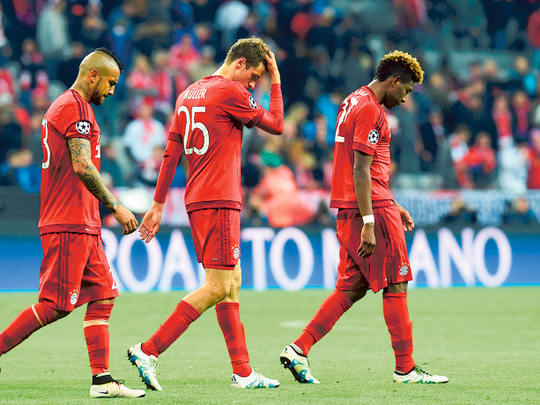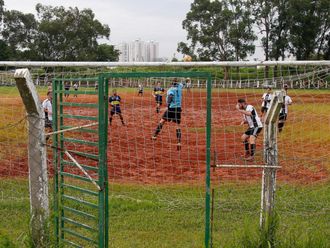
As Antoine Griezmann slotted the ball past Manuel Neuer on Tuesday night, Atletico Madrid celebrated wildly while Bayern Munich’s heads sunk.
The away goal. There is very much a reason the saying goes that away goals count double...
What is the away goals rule?
If the final aggregate scores are equal in a two-legged tie played at home and away, the team with the most goals in their away fixture progresses. For example, Atletico Madrid beat Bayern Munich 1-0 at home before losing 2-1 away in this week’s Uefa Champions League semi-final, which finished 2-2 on aggregate. Atletico progressed on account of their away goal. The rule was first introduced by Uefa in 1965 and made its European Cup debut in 1967/68. Previously, ties level on aggregate went to a third game at a neutral venue and if that game finished equal the winner was bizarrely decided by a coin toss.
Why was the rule introduced?
Firstly, to overcome the logistical and financial strains that arose when two teams drew on aggregate and a third game had to be hurriedly organised at a neutral venue before the next round of the competition - and also around both side’s busy domestic calendar.
It also eliminated the need for a cruel and farcical coin toss after 270 minutes of football, and encouraged more entertaining and attacking football from the visiting side who would have otherwise sat back and held on until the second leg at home.
Effect and criticism
It’s had an opposite effect to what was initially intended, as home sides are playing extra cautiously in order to avoid conceding a weighted goal. Far from promoting attacking football, matches, particularly first legs, have actually become snore-draw bore-fests, like Manchester City’s goalless first leg at home to Real Madrid in the Champions League semi-final.
It also gives momentum to the team playing away first, like Real, with the home side, in this case City, having squandered their advantage in the first leg due to fears of conceding an away goal. Real proved this to be true this week as they won the second leg 1-0 at home to progress to the final with Atletico.
There’s also the fact that if a game is still drawn after two legs with neither side having taken an away goal, it goes to extra-time, giving the away team in the second leg the unfair advantage of playing an additional 30 minutes with which to nick an away goal.
Another consideration is that back when this rule was invented it was a lot harder to nick an away goal due to the quality and difference of pitches and the lack of counter-attacking style football, thus justifying the value of scoring away from home. But now that most pitches are the same and counter-attacking is commonplace, away goals aren’t as rare.
Critics
Arsenal coach Arsene Wenger: “The rule was created in the 1960s to favour attacking teams but football has changed. If people want to keep it I would suggest it only counts after extra time, but to be honest, I am ready to scrap it completely and go straight to penalties.”
Former Manchester United coach Sir Alex Ferguson: “There was a bit of debate about whether it has any significance today. Some think it’s not as important as it used to be… and the attacking emphasis on the game today means more teams go away from home and win. If we go back, say, 30 years, counter-attacking consisted of one or maybe two, players. Today, counter-attacks have players flooding forward in fives or sixes and really positive, quick, passing.”
Local supporters
Muscat-based former Aston Villa goalkeeper John Burridge: “I can’t think of a better alternative to deciding matches drawn after two legs. If you go to extra time and penalties it would tire a team and put them at a disadvantage for the final. There are too many games in a season as it is.”
Even though he was once part of a Celtic side that went out on away goals to Partizan Belgrade in 1989 despite winning 5-4 at home in an extraordinary European match, Dubai-based former Hoops defender Derek Whyte said: “There’s nothing worse than extra time and penalties. I think the away goals rule is a fairer way to decide games tied over two legs. You could argue it kills the game a little bit, particularly in the first leg, but there’s no rule in the rulebook that says you can’t play defensive football. It gives the opposition a different problem to deal with, can they break down their opponent away from home?”












